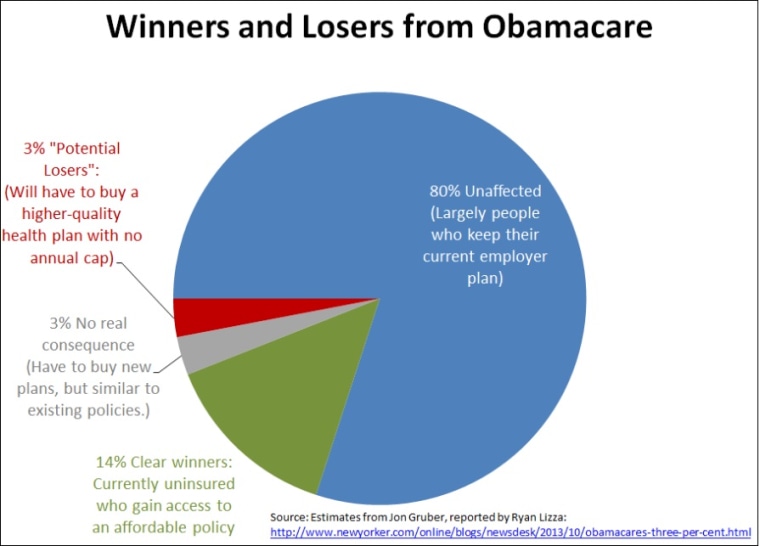
If the Republican National Committee had written the script for the week, it wouldn't have gone quite this well for the right. The political world took a relatively obscure element of the debate over health care -- insurers informing consumers about replacing poor, outdated coverage plans with new, better plans -- and turned it into a "controversy."
In an amazing twist, conservative Republicans who are desperate to take away coverage for millions of Americans are pretending to be outraged on behalf of Americans whose plans are being upgraded.
As we talked about earlier in the week, I'm not terribly impressed by the sudden apoplectic outburst from reporters and Republicans, but let's consider the above pie chart and get a little more specific.
MIT's Jonathan Gruber, an economist who helped then-Gov. Mitt Romney (R) shape health care reform in Massachusetts, told Ryan Lizza this week about a percentage breakdown: how many Americans will be unaffected (consumers who'll keep their current employer-based plan), how many will break even (those who'll get a new plan, but it'll cost the same as their current plan), who many will win (those who'll get new coverage that's cheaper than what they're paying now), and how many will "lose" (those whose new plan will be better, but will cost more). It led University of Michigan economist and Brookings fellow Justin Wolfers to put together the above image based on Gruber's assessment.
To be sure, the point isn't to say that those 3% in the red slice are unimportant. Obviously, everyone matters. Rather, if all you relied upon was general media coverage over the last several days, one might assume that that the "losers" under the Affordable Care Act represented nearly 100% of the U.S. population.
They're not. It's not even close.
Gruber told Lizza that 97% of Americans will either be left alone or will be clear winners. "We have to as a society be able to accept that," he said. "Don't get me wrong, that's a shame, but no law in the history of America makes everyone better off."
I've seen some overnight pushback, arguing that Gruber's numbers are rough estimates, not precise assessments. That's true. What's more, results will also vary by state. But let's not miss the forest for the trees -- even if the totals are off by a few percentage points, the key takeaway here is that the hair-on-fire coverage about Americans "losing" their current health plans, and having insurance get "canceled" on them, has been exaggerated to levels that clearly mislead the public at large.
For that matter, in case this isn't obvious, the "losers" in this scenario aren't actually losing -- they're paying more for better coverage and more health care security, which will almost certainly save them money if, say, they get sick.
Dylan Scott explained this morning, "What really matters is, what happens to the people who are receiving those cancellation letters that congressional Republicans have been parading in front of the cameras? The bottom line: Almost all of them are going to receive the same or much better coverage, and many of them are going to receive financial help to purchase it."
If this week is any guide, we'll see just about every single American in that 3% tell their story very soon, but to think they're representative of most of the country is an important mistake.
Postscript: Let's also try to remember that phasing out old, substandard plans is something to be celebrated, not condemned. As Jon Chait noted this morning, the sooner the awful insurance goes away, the better it is for all consumers and the health care system in general.